Our editors share a few of their most memorable books of the year
(we also shared our recommended reading from the first half of the year a few months ago)
+
Michelle Bailat-Jones, translations editor
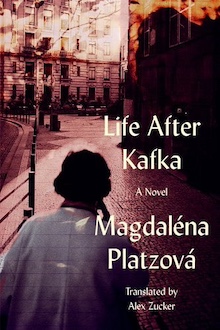
In Life After Kafka by Magdaléna Platzová, translated from the Czech by Alex Zucker (Bellevue Literary Press, 2024), the literary footnote that opens onto a whole new story is intricately expanded by renowned Czech writer Platzová. In this collage of a novel, Platzová is less interested in crafting a fictional, coherent story about a relatively unknown figure (Kafka’s first fiancée, Felice Bauer) than in posing layered questions about what it means to have a role in a famous writer’s legacy, and how that role transforms real people into characters. This shifts the book into a conversation about the continuous overlapping of fiction and non-fiction—a common enough discussion but one that doesn’t often sprout from this particular seed. I found that new angle fresh and inspiring.
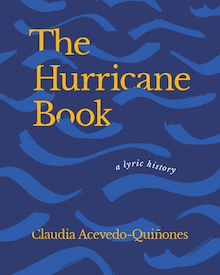
Something about this past year had me reading and enjoying a number of collage-type, hybrid works. The Hurricane Book by Claudia Acevedo-Quiñones (Rose Metal Press, 2023) is a true collage of maps, poems, historical facts, photographs, “fictionalized” family histories, and memoir-style recollections. The book charts six different hurricanes that have made landfall over Puerto Rico since 1928 while also charting the author’s life and many of the different lives in her family history. It’s a book about a country in the political, environmental, historical and physical senses but within its patchwork of prose and artifact, The Hurricane Book contemplates the notion of a person’s interior country and how that delicate “landmass” is shaped, formed, twisted, queried, nurtured, eulogized, and celebrated.
+
Lacey Dunham, fiction editor
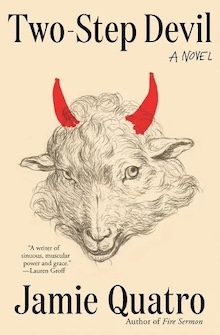
Jamie Quatro’s Southern Gothic novel Two-Step Devil (Grove Atlantic, 2024) blazes with ripe, beautiful language, bringing together an elderly outsider artist with visions who is known as the Prophet, a child named Michael trying to survive, and the devil, wearing a cowboy hat. By chance, the paths of the Prophet and Michael collide, and they end up living together at a rundown cabin deep in the backwoods of Georgia’s Lookout Mountain, where the Prophet paints his visions and fights off the devil’s intrusions. Guiding the reader through landscapes of modern human tragedy that, in another writer’s hands, would quickly become melodramatic, Quatro renders the fraught, complex, and strange relationship between Michael and the Prophet with loving empathy in a slow-burn narrative of humanity and grace.
+
Diane Josefowicz, books editor
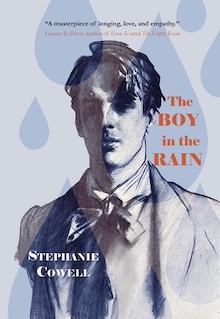
This year, fiction was my escape from the headlines, but what I found in my reading was not relief from ambivalence and drama so much as salutary new perspectives on them. I’ll start with The Boy in the Rain by Stephanie Cowell (Regal House, 2023), an engrossing novel focused on a love affair between Robbie, a poor and unconnected artist, and Anton, whose inherited wealth grants him leisure and freedom from want but shelters neither of them from the intense homophobia of Edwardian England. An attentive observer of nuances—from the movement of of light on the ancient streets of central London to the shifting weather of the inmost self—Cowell vividly portrays the evolution of a substantial relationship, both magical and vexed, while showing the insidious ways in which bigotry and hatred eat away at people and communities, giving rise to unbearable sadness and shame.
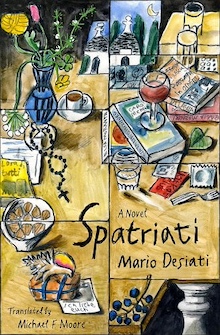
A sweeping portrait of another vexed relationship, Spatriati by Mario Desiati, translated from the Italian by Michael F. Moore (Other Press, 2024) traces the linked and complicated fortunes of childhood friends Claudia and Francesco, who are growing up in Puglia when their lives are thrown into chaos by an affair between Francesco’s flamboyant mother and Claudia’s distant father. Francesco’s ambiguous family background makes him doubly an outsider in provincial Puglia, but he grows into a stubborn fighter who stays close to home, carving out his claim to life on his own terms. Claudia attempts to escape Puglia by running off to find independent work and sexual adventure in Milan, but she finds herself drawn back to Puglia, and to Francesco, who represents home to her despite his own feelings of not belonging in their town. If the breezy translation belies the gravity of the book’s themes, it’s only because these lovable characters are themselves masters of a lively sprezzatura despite the difficulties of their lives.
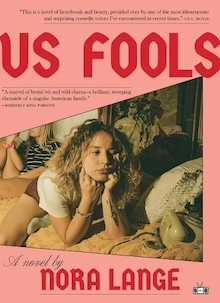
Us Fools by Nora Lange (Two Dollar Radio, 2024) is set on a 1970s Midwestern farm where a couple of idealists have decided to start a family at just the moment that ruinous agricultural policy and short-sighting lending are sending small farms like theirs over a financial cliff. Their children, an inseparable pair of sisters named Bernadette and Joanne, make ever stranger and more outrageous gambits for attention, from staging a sperm whale drawing competition at school, which forces teachers to explain the meaning of “sperm” to their charges, to bouts of manic jumping off the roof. With huge loans coming due, and under pressure to take on even more debt, their parents have little time and less patience for their antics, which leaves them only each other. “Days went by in that drafty garret with a pitched roof and one small window we fought over,” recalls Bernadette, who longs for peace, stability, and social acceptance. Her knowing sister reminds her, “Admiration is code for scorn.”
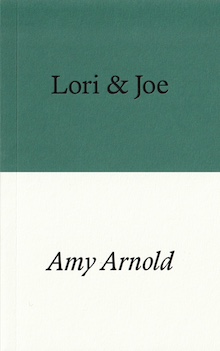
My final pick is Lori & Joe by Amy Arnold (Prototype, 2023), a short, affecting novel that unfolds over a single morning when Lori, one half of the eponymous principal pair, discovers her husband Joe dead in their bed. This should be a dramatic development, and it does propel the story forward, but slowly, mimicking the inexorable yet nearly imperceptible geological processes that Lori sees at work all around her in their quiet Lake District neighborhood. As she takes a long walk up and over a nearby hill, Lori in her glacial way begins to come to terms not only with Joe’s death but also with the imperfect life she has built around him. Theirs is a world of two seemingly caught inside a snow globe, complete with enfolding mists and no shortage of terrors and secrets imperfectly confronted and endlessly revisited, each shake of the globe showing a slightly different angle on Lori’s choices, their effects, and her subsequent revision of the meaning of each significant event. The ambiguity of their relationship is altogether transfixing, captured in the book’s epigraph by the poet and artist Etel Adnan: “To be in the fog is to be in a state of suspension. What’s true then is not true: the mind’s liberation.”
+
Steve Himmer, editor-in-chief

Rhine Journey by Ann Schlee (McNally Editions, 2024) was first published in 1980, a fact that, as Lauren Groff writes in her foreword to this reissue, will cause readers to make a double-take. I certainly did. The novel follows Charlotte, a middle-aged Englishwoman traveling on the Rhine in 1851 with her brother, sister-in-law, and niece, but more than a travelogue it’s a close up view of the simmering, suppressed tensions between and within those characters. The smallest moments and most mundane gestures become fraught in Schlee’s hands. I agree wholeheartedly with reviewers who have praised her ability to create not an anachronistic modern-minded woman but instead occupy the mind of a woman of Charlotte’s time. That makes her a frustrating character at times, as her constrained anger at the life forced upon her increases while her action against it does not, but it also makes her an impressive one. Schlee’s ability to subvert expectations is thrilling as she boldly, confidently steers away from what might seem like the more exciting elements of a scene or the story and instead finds hidden power where another writer may not have looked.

OKPsyche by Anya Johanna Deniro (Small Beer Press, 2023) adds layers upon layers so that you never know quite what you’re reading, or more to the point quite what you’re going to read. The second-person protagonist is a trans woman struggling with loss of access to her son alongside all the other challenges of quotidian life like paying the bills and getting older. It depicts starkly the angst of parenting, of being who you are while also trying to be who they expect you to be — this is a particular performance of that tricky navigation, but it’s one in which any parent will recognize their own version. DeNiro’s attention to the nameless protagonist’s daily indignities, from the frustrations of wearing a wig to enduring aggression and disrespect from strangers, develops alongside a mysterious, increasing sense of violent political menace from the world around the characters. It’s our own world but off-kilter, or perhaps accelerated from where we are now toward where we might be before long, and that dread creeps in from the edges of the story to give readers some sense of what the narrator experiences moving through public space worried about who is watching and how. As we all are, but not always in the same ways.
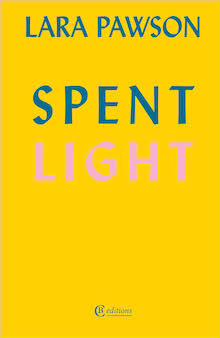
Finally, a book I wrote about in our weekly newsletter but haven’t mentioned here on the site: Spent Light by Lara Pawson (CB Editions, 2024). Its own cover categorizes it as FICTION/MEMOIR/HISTORY and that hybridity is just one of the ways Pawson’s book is challenging and thrilling and heartbreaking and uplifting at once. What can I say about Spent Light except that it’s trying to look the world right in the eye, to see and express the ways global violence is bound up in our lives wherever we live (right down to the appliances we use in our kitchens and the objects decorating our homes) but to say that sounds pedantic and reductive which the book itself very much isn’t. What you should do instead of listening to me try to describe it is read it yourself. It’s a book I’ve found myself thinking about often this year, months after reading it.